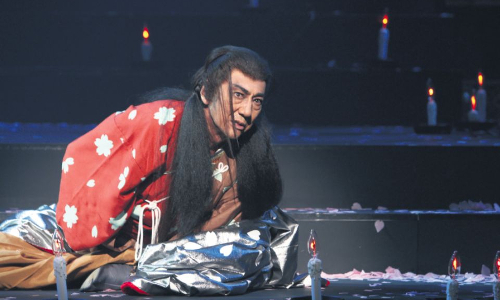Review: Macbeth

As the lights go down for this singular version of Macbeth, two bowed old women hobble onto the stage and grapple with the gigantic screens on either side, parting them like curtains in a film house.
It’s a fitting way to begin a production that uses a distinctly cinematic visual language, with the action often viewed through a gauze as if it were a projected image. Transposed to ancient Japan, it has the steady grace and fluid movement of a Kurosawa movie, or even Tarantino’s samurai homage Kill Bill.
It’s exactly 30 years since this production was first staged at the Barbican, catapulting its director, Yukio Ninagawa, to international stardom. He has since directed everything from Greek tragedy to contemporary Japanese fiction; I saw his version of Haruki Murakami’s seemingly unadaptable novel Kafka on the Shore in 2015 and it was one of the year’s theatrical highlights.
This production, a celebratory tour following his death last year, is all spectacle. Every costume, every prop, every hand-painted backdrop is a sumptuous delight – it’s all so rich it threatens to give you indigestion.
There are some wonderful translations in the shift to ancient Japan – the three witches become grotesque kabuki-style geishas, the woods of Dunsinane are now cherry blossom trees, and the battle sequences are reimagined as balletic encounters between rival samurai. This Macbeth is an ageing feudal lord, a true nobleman who wears his misdeeds especially heavily. Likewise, his Lady Macbeth is portrayed as a victim of herself, rather than a simple catalyst for evil. All the while an orchestral score leaves you in no doubt about just how sad and dramatic it all is; it even uses Samuel Barber’s Adagio for Strings, a piece of music so overused in Hollywood that it’s been reduced to cliche.
The style of acting is a little more overwrought than English audiences are used to, with every line by every character howled with the same level of intensity as when Macduff learns his family have been brutally hacked to pieces. This ceases to be much of an issue in the second half, when every line of Shakespeare’s prose is suffused with melodrama anyway; it’s hardly a subtle play, after all.
But who needs subtlety when you have the guiding hand of Ninagawa? This is an exceptional tribute to an exceptional career.
First published in City A.M.

